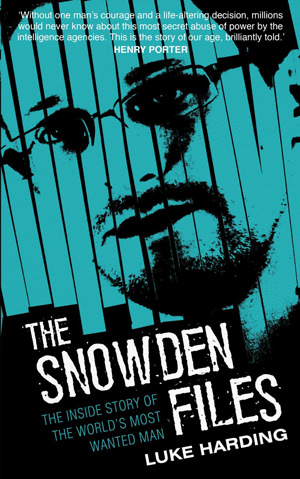 The Snowden Files by Luke Harding
The Snowden Files by Luke HardingPublished by: Vintage on February 7, 2014
Genre: Non-Fiction, Politics, Technology
Pages: 352
Source: Purchased
Book Details
Rating: ★★★
IT BEGAN WITH A TANTALIZING, ANONYMOUS EMAIL: “I AM A SENIOR MEMBER OF THE INTELLIGENCE COMMUNITY.”
What followed was the most spectacular intelligence breach ever, brought about by one extraordinary man. Edward Snowden was a 29-year-old computer genius working for the National Security Agency when he shocked the world by exposing the near-universal mass surveillance programs of the United States government. His whistleblowing has shaken the leaders of nations worldwide, and generated a passionate public debate on the dangers of global monitoring and the threat to individual privacy.
In a tour de force of investigative journalism that reads like a spy novel, award-winning Guardian reporter Luke Harding tells Snowden’s astonishing story—from the day he left his glamorous girlfriend in Honolulu carrying a hard drive full of secrets, to the weeks of his secret-spilling in Hong Kong, to his battle for asylum and his exile in Moscow. For the first time, Harding brings together the many sources and strands of the story—touching on everything from concerns about domestic spying to the complicity of the tech sector—while also placing us in the room with Edward Snowden himself. The result is a gripping insider narrative—and a necessary and timely account of what is at stake for all of us in the new digital age.
The Snowden Files is like something out of a fiction dystopian book. Obviously the events from this book are real, and I knew the overall story before going in. But The Snowden Files lays it out in a way that just feels so amazingly dystopian.
The agency had set up fake local internet cafes equipped with key-logging software. This allowed GCHQ to hack delegates’ passwords, which could be exploited later.
The lengths that the NSA/GCHQ went to to monitor communications was insane! I thought it was pretty hilarious how Google, Facebook, etc. were all so certain that the NSA didn’t have “direct access”.
There is no back-door way of giving data to the NSA. It’s all through the front door. They send us court orders. We are obligated by law to follow them.
…but oh wait! The NSA tapped the fibre cables between their data centers, allowing them to gain direct access. LOL.
The NSA was secretly tapping data from Yahoo and Google. The method was ingenious: ‘on British territory’, the agency had hacked into the private fibre-optic links that interconnect Yahoo and Google’s own data centres around the world.
I loved learning about the more specific details of how the NSA achieved their mass ‘spying’.
TAO managed to hack into the mail server hosting President Calderó’s public email account. [..] The NSA was delighted. It could now read ‘diplomatic, economic and leadership communications’ which provided ‘insight into Mexico’s political system and internal stability’.
And it’s pretty funny how some countries reacted to all this:
After discovering that the NSA bugged its diplomats, the Indian government turned to old technology. From the summer of 2013 the Indian High Commission in London began using typewriters again. [..] The Russians had reached the same conclusion. The Kremlin’s super-secret Federal Protection Service (FSO) [..] put in a large order for typewriters.
I think it’s hard for me to properly review and rate this book because I don’t usually read non-fiction. So I think I’m trying to rate this book without that bearing too much weight. Yes this book was interesting. Did I adore it? No. But I don’t “adore” non-fiction books in general, so that’s nothing against this particular book.
One of my criticisms from the beginning was that the book wasn’t super linear. I guess this improved a little as the book went on, but in the beginning, the author was constantly jumping between the “then” and the “now”. I wish he’d just tell the story from start to finish instead of hopping back and forth between “the story” and what happened afterwards. It was a bit jarring at times.
I’ll admit, I did feel my interest waning a bit as the book went on. I feel like I was intrigued by all the juicy tidbits we got at the beginning, but by the end, I didn’t feel like I was really learning a ton of new information. I was skimming to get to the end, and when I finally did, it wasn’t climactic. (It literally just…ended.)
Before and after reading this book I always had an, “I don’t really care” opinion about the NSA logging my conversations or emails. I know some people are really against it, and I understand how it is a violation of privacy. But as long as I’m not being arrested for just voicing my opinions, I really don’t care if they’re collecting data about me. Ultimately, there’s not someone sitting behind a computer reading my emails and laughing at them. And I think there’s just so much distance between me and the NSA that I just don’t care what they see of mine, even if it is private. They don’t know me, I don’t know them, we’ll probably never meet, so whatever.
However, some of the things are just ridiculous. Like:
[The NSA] had even put secret back doors into online encryption software—used to make secure bank payments—weakening the system for everybody.
There’s a difference between farming data that they may wade through for some vague sense of “national security”, and actually endangering people by compromising their own security. Sheesh.
Paradoxically, in its quest to make Americans more secure, the NSA has made American communications less secure; it has undermined the safety of the entire internet.
How do you feel about the government keeping track of all your phone calls, emails, and other technological activity?
The Verdict


Ohhh. This book sounds super interesting. I don’t know, but I think this one would be nice to read. Interesting at least. The government is tracking down everything, I can’t do anything about it, so I’m just letting them do whatever they want to do. It’s not that I’m sending secretive messages. Most of our lives is put on Facebook, twitter, our blogs etc anyways.
This book sounds so interesting! I really like reading nonfiction and I am getting more into it, so I definitely need to pick this up. Snowden’s story is so interesting to me. And the NSA really freaks me out. I understand why it’s there (to protect us) but it just seems a little scary what they have the power to do. And it also seems very 1984-esque.
Hmm learning about the NSA would definitely be fun, especially because the lengths they went to to monitor everyone is just crazy! Non-fiction usually isn’t my thing, either, but I’m glad you actually liked this one!
Well I guess you don’t mind your activity being tracked as long as it’s not used against you. And it’s hard to know *what* exactly can be used against you. In the past, people didn’t think that Facebook photos would have them fired or rejected for a job. It ended up that it happened.
That’s mostly why I wouldn’t want my data to be recorded. I don’t do/say anything wrong that I want to hide, it’s not that. It’s more about the door you leave open if you do accept it. Is it really ok that personal and private informations are virtually accessible about you if requested? What if they decide that it’s ok to check your mail in case of trial, to decide if you deserve welfare when you say you need it, or a grant to pay your university tuition, etc.
I think it’s potentially really dangerous and extremely tempting (otherwise, FB wouldn’t deploy so much effort to get and sell personal data).